Publisher's note: When you finish this Wyatt review, please spend a few moments using our Movie Database,
and feel welcome to return. Nearly everything important to movies, plus great images are there.
 Redemption in the Fog of War
Redemption in the Fog of War
The redemptive process, from seeing clearly the good and the bad of terrible times, defines and hones the best of humanity, and thus has preserved our species for millennia, and may sustain us for many more.
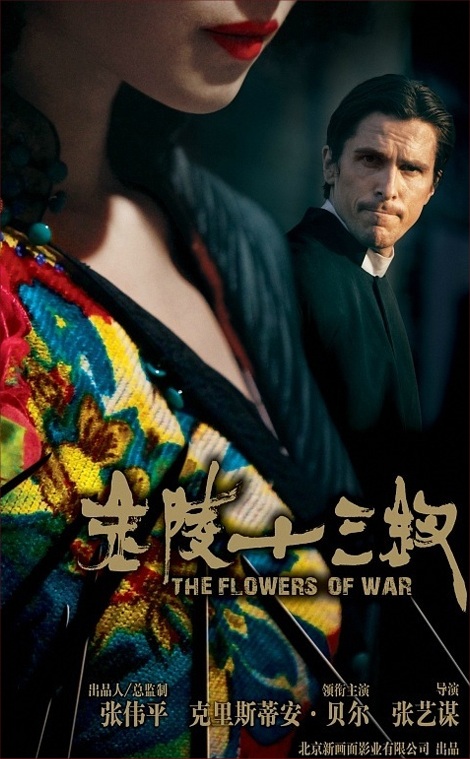
Such was the resounding message from
legendary Chinese Director, Yimou Zhang, who crafted the Geling Yana novel into a senses consuming film, which was as emotionally riveting as the titular story, based on true events, and of humanity rising above the barbarity of Imperial Japan during the Rape of Nanking.
Beginning on December 13, 1937 near the onset of the Second Sino-Japanese War, which was an Eastern and bloody prelude to World War II, the Imperial Japanese Army systematically raped and murdered an estimated 250,000 to 300,000 Nationalist Chinese in the city of Nanking (Nanjing) over a 6 week period of abject brutality and intense horror.
The nexus of Director Yimou Zhang's morality play, with the backdrop of the Nanking horror ever present, was a Western Catholic Convent for Chinese girls that had just suffered the death of their German headmaster. An American mortician, John Miller, played by the intense English Actor Christian Bale, was called to preserve the remains, and then all Hell broke loose in the form of the Nanking Massacre.
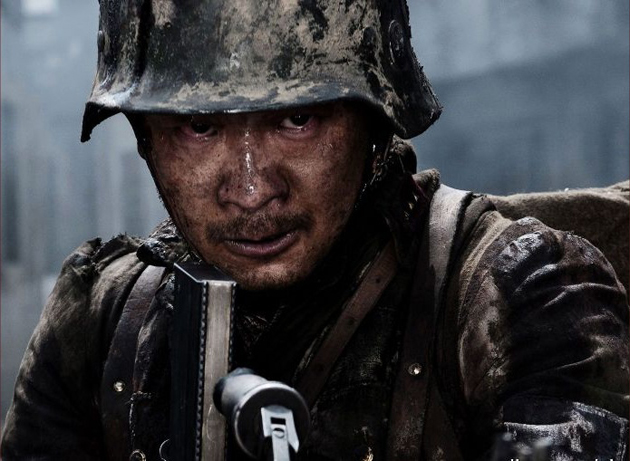 The remaining Chinese soldiers, donning German helmets (Adolf Hitler's Germany actually aided the Chinese against his future allies Imperial Japan) near the convent actually cleared a way through the murderous Japanese soldiers, so the remaining girls, still alive, could return to the convent: Above and below.
The remaining Chinese soldiers, donning German helmets (Adolf Hitler's Germany actually aided the Chinese against his future allies Imperial Japan) near the convent actually cleared a way through the murderous Japanese soldiers, so the remaining girls, still alive, could return to the convent: Above and below.
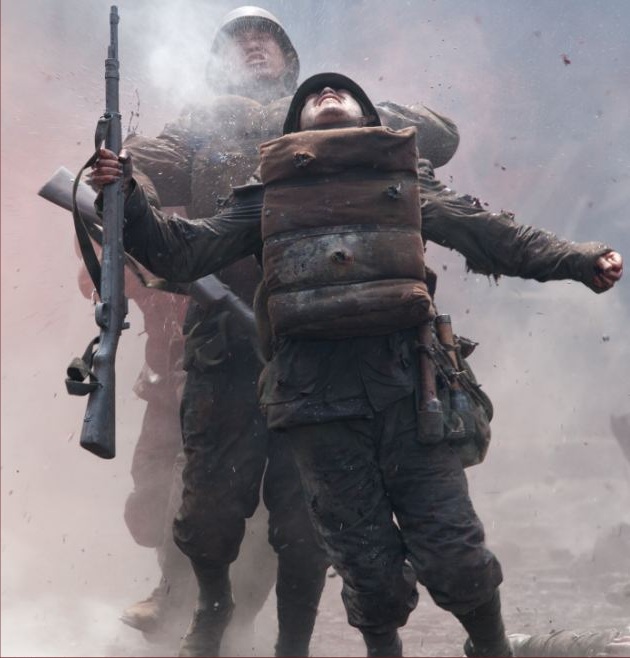
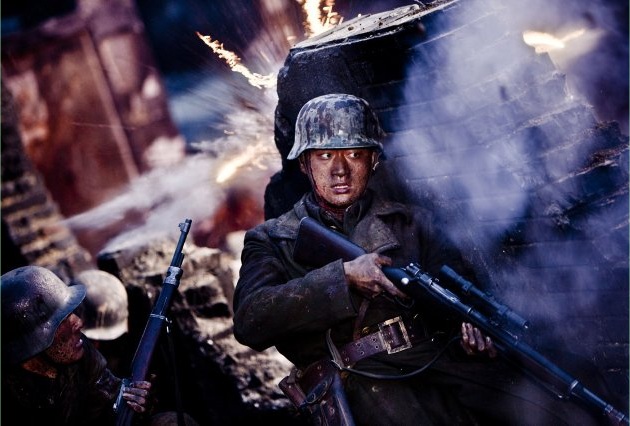 Major Li (right), played by Dawei Tong, takes charge of his troops to clear that path: Above. Consequently, the girls make their way back to the convent through the debris filled streets of Nanking: Below.
Major Li (right), played by Dawei Tong, takes charge of his troops to clear that path: Above. Consequently, the girls make their way back to the convent through the debris filled streets of Nanking: Below.
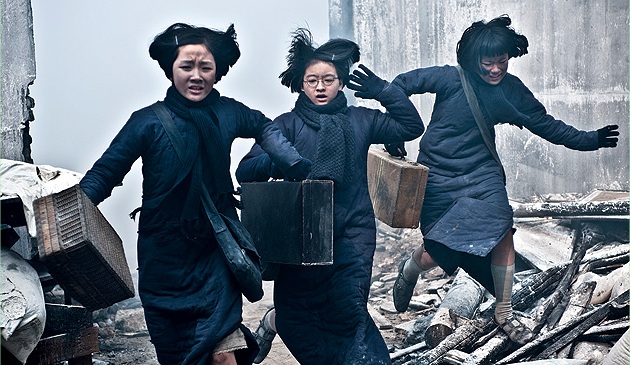
With the United States of America not at war with any nationality, and in complete isolation during this historical period that was a maelstrom of constant and bloody conflict, John Miller expected safe conduct across the horror of Nanking, and heads toward the convent. On his way toward the convent, John Miller, Christian Bale, serendipitously happens upon a few of the Catholic Convent's girls under the worst of circumstances - a group of their fellow refugees are murdered by Japanese soldiers. Mortician Miller has narrowly escaped death as well, and hurries these Nanking girls back to the convent, where he discovers that his job is negated by the evaporation of the headmaster's body, by virtue of large Japanese bomb explosion in the convent's courtyard - the impromptu location of the body. After the dangers encountered en route, the American mortician expects payment nonetheless, and remains for his fee, and the best bed (the deceased headmaster's) he "has seen in years."
With no adults caring for the convent's girls, except the deceased headmaster's adopted son, George Chen, played by Tianyuan Huang, John Miller, Christian Bale, has his way in the convent, where he discovers a plethora of wine made by the inhabitants to finance the sustenance of the convent's inhabitants. Also, the American's sensibilities toward noble ambitions are further dashed by the assembly of "the Famous Women of the Chang Jiang River (Yangtze River)", as described by the Narrator, Shu, played by Xinyi Zhang, who took refuge in the convent.
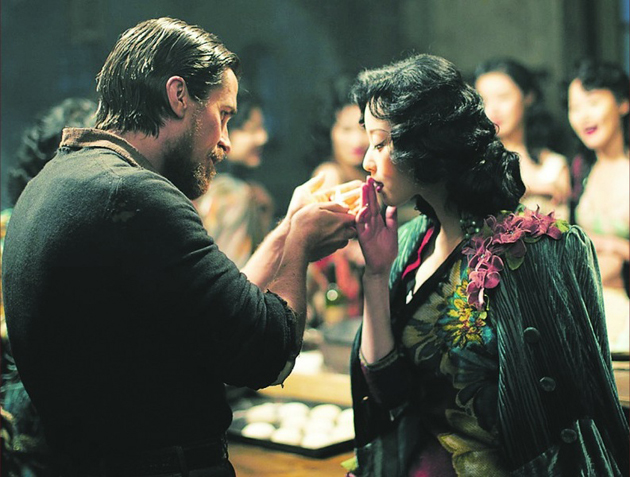 John Miller, Christian Bale, full of wine and mirth in these terrible times, curries favour with these "the Famous Women of the Chang Jiang River:" Above and below.
John Miller, Christian Bale, full of wine and mirth in these terrible times, curries favour with these "the Famous Women of the Chang Jiang River:" Above and below.
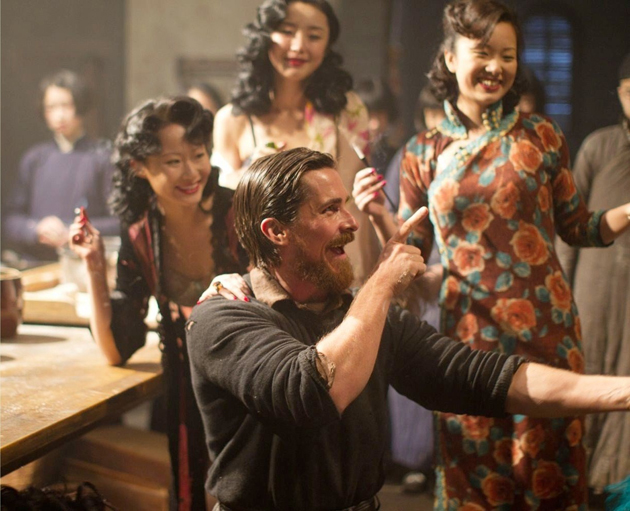
These
"Famous Women of the Chang Jiang River" were whores - lovely, clean and classy, but whores nonetheless. And the one thing we learned early about American John Miller, Christian Bale - he did love his wine and his whores. He was even willing to pay for the services of the lead whore, Yu Mo, played by Chinese Actress Ni Ni. In fact much of this 146 minute film was spent sharing with us just how ignoble American John Miller was juxtaposed against the Rape of Nanking. Fortunately, Director Zhang spent enough precious minutes showing another side of that "Ugly American."
John Miller's unlikely transformation from rouge mortician abroad to sympathetic hero to, and saviour of, these innocent children of God was a metamorphosis of expeditious enormity. Christian Bale's John Miller sped from hung-over rouge, oddly dressed in a priest frock to coward-in-hiding to improbable hero in a manner of minutes.
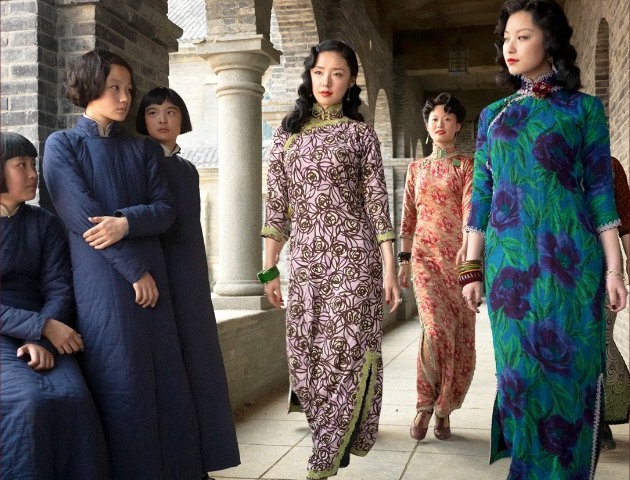 The Whores from the Yangtze River were cultured and refined, but whores nonetheless: Above and below.
The Whores from the Yangtze River were cultured and refined, but whores nonetheless: Above and below.

The impetus for the transformation - rabid Japanese soldiers, inside the convent walls, and on the hunt for fresh meat: young, innocent Chinese children.
Succinctly put, the Imperial Japanese Army was literally franchising the Rape of Nanking inside the sturdy walls of the Catholic Convent, and their wild penchant for the horrible was well on display. Within minutes, the body count was one child dead, one child in the process of being raped, and the rest of the girls on the run within the walls of the convent, screaming in the face of the inestimable horror. John Miller had two choices: 1. Remain in hiding, risk being caught, and allow the rape and pillage to continue unabated, 2. Be a man of strength, and speak for the innocence of the children.
































